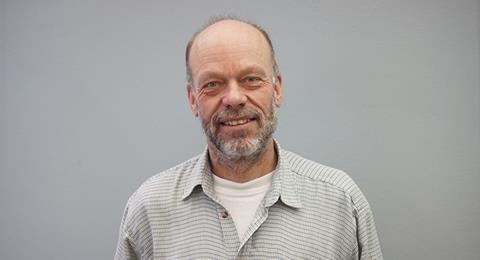Dr Richard Scott “overstepped the boundaries” by praying with a patient, according to a tribunal. It isn’t the first time the Christian GP has faced censure, yet he is determined to continue sharing his faith at work. He explains why

The heavy envelope filling my letterbox in 2010 was no love letter. A troubled young man had stormed out of my GP consultation two months earlier. Complaining to my professional governing body, the General Medical Council (GMC) that I’d only talked to him about Jesus, he disregarded the other, lengthier aspects of our discussion. Taking him at his word, a GMC Fitness to Practice case changed my life in an instant. On my knees I sought help from our God, to whom this came as no surprise.
How did it get to this? I was a late entrant to general practice. Returning from the medical mission field spiritually dry in 1995, God quickly led my wife, Heather, to discover Alpha. Heather and I ran the course in our living room for fellow parents from the school playground. When we reached week seven, the theme was: “Telling others”. I felt like Nicky Gumbel was talking directly to me. I was stunned. Even as a medic running a Tanzanian mission hospital I’d not properly grasped this Christian essential. I resolved to put that right and start where I was best placed: at work.
Inexperienced and hesitant, I plucked up the courage to speak to two patients in my trainee year. Nothing much happened but the sky didn’t cave in. Sensing that Jesus should make a big difference in patients’ lives, I put aside selfishness (I’m a Christian so I’m OK) and did a deal with God: put me in a general practice in a poor seaside town with a decent school and I’ll really go for it. Most GPs look for a job once training is over. God revealed ours within three weeks of starting the traineeship: Heather and I were to job-share in Margate.
Newly qualified, my side of the bargain soon became clear. Drug addicts poured into my room. Prescriptions proved helpless in alleviating an unholy cycle of prison, release, a £46 governmental allowance squandered with the assistance of unsuitable friends, thieving and further incarceration. If medicine couldn’t change their lives, could Jesus?
Over the next five years, my statistics showed that for every eight addicts I invited to Alpha, two attended and one became a Christian. Two of my earliest patients illustrated the vital importance of faith in the workplace. Fed drugs by his brothers from age eight, Tyrone had spent 17 of his 42 years in prison before accepting Christ and leaving heroin behind. Mark came from a different background. Privately schooled, he dabbled in drugs, which led to nine jail sentences, ending only with Alpha. A skilled musician, he found Christ and became our church’s bass guitarist.
We are all called to evangelise. Avoiding doing so at work is a cop-out
Encouraged by the benefit to this cohort of desperate patients I broadened my approach, reaching out to alcoholics and mental health patients. Subsequent lives changed included an angry woman who practised martial arts, who stopped kicking her father-in-law through plate-glass windows. Wanting more, I entered dangerous territory, praying: God, make me more significant in this country. His answer was not what I envisaged. No platform at Spring Harvest. Just a professional warning. But one which would give me the opportunity to publicly defend why faith matters at work.
Spiritual complaints
All professionals get complaints and doctors are not immune. Most revolve around a perceived lack of communication, diagnosis or treatment. Spiritual complaints are different. The issue is of excess – providing more than the patient wanted or expected. Before the big one, I’d had a number of minor spiritual complaints, dealt with at practice level.
In my experience, nine out of ten patients opt in when offered an extra spiritual angle that has helped many others sitting in their chair. Occasionally, a consenting patient later objects, usually at the behest of a family member or friend.
It takes a lot to admit to a medical professional that you’re at the end of your tether. Stepping into my room, patients strip off their masks and freely admit to harm done by themselves or others. Stuck, and with their lives no longer in control, they are often desperate for help. Suggesting a different approach is the easy bit. Involving God is more controversial. Personal faith stories, not least my own, are fine. Discovering that thousands of scientific papers show the health benefits of faith is also OK. But getting personal through offering prayer, church and a gospel booklet is a step too far for some. Truly bringing faith into the consultation challenges both patient and doctor.
A decade ago, I highlighted the work of my lawyers at Christian Concern. The book I produced, Christians in the Firing Line (Wilberforce Publications), posed a simple question: What do a doctor, an electrician, a beautician, a magistrate, a nurse and a counsellor have in common? Answer: Censure in the workplace because of their Christian faith.
Ex-addicts have thanked me for being a cog in their recovery journeys
The recently published sequel continues the theme with a wide range of Christians who have run into trouble for expressing their faith: A nurse dismissed for sharing her faith with worried patients prior to surgery. An occupational therapist suspended for reaching out to an anxious Muslim junior colleague. A student social worker thrown off his course for defending biblical teaching on marriage. Street preachers arrested. The list goes on.
Paying the price
Standing firm in the face of a highly unsupportive culture is risky. The cases in my two books reflect burgeoning Christian marginalisation in the UK. Last year, Christian Concern received 1,000 enquiries for assistance. Put your head above the parapet and you will be shot at. The devil hates it when we open our mouths for Christ.
Scripture makes plain the cost of evangelism. In Mark 8:38, Jesus described his generation as “adulterous and sinful” (ESV), a situation surely comparable to ours today. In Matthew 10:25-33 he told his disciples to proclaim the good news “from the roofs”, unashamedly, without fear. Servants must resemble their masters, he said. Speaking out is mandatory: “Whoever acknowledges me before others, I will also acknowledge before my Father in heaven. But whoever disowns me before others, I will disown before my Father in heaven”, he added. Tough teaching! So we must toughen up.
The apostle Paul was beaten repeatedly for refusing to be silenced (2 Corinthians 11:25). This is the reality for many of our brothers and sisters in Christ worldwide today. In the UK, Christians rarely suffer physical violence, not forgetting Hatun Tash, whose face was slashed at Speaker’s Corner in 2021 after preaching the gospel to a Muslim audience. But marginalisation at work is alive and kicking. Christians are being warned, suspended, black-listed from their professional organisations and sacked. Some never work again.
If medicine couldn’t change their lives, could Jesus?
Sanctions, even hatred, are not too tempting. So why should we bother? In short, because witnessing is God’s design and, therefore, it works. In 2 Timothy 2:8-9, Paul states: “Remember Jesus Christ, raised from the dead, descended from David. This is my gospel, for which I am suffering even to the point of being chained like a criminal. But God’s word is not chained.” Preaching the gospel upset everyone – the Romans, the Jews and the Greeks. Yet people from all of those groups became Christians. Paul was writing to Timothy from prison, but his chains didn’t shackle God’s word. The Holy Spirit isn’t dependent on our situation. Being open about our Christian faith at work may not delight our bosses, colleagues or clients but, as Isaiah makes clear, the words that go out from our mouths won’t return empty (see 55:11).
Witnessing works but, in the workplace, it is risky. Can’t we love and seek the lost somewhere else? Again, scripture provides the answer. It abounds with faithful – but initially reluctant – workers, notably Moses, Gideon, Esther, Jeremiah, Jonah and Jesus’ disciples. Their workplaces were dangerous and they were understandably hesitant. Why me, God? Can’t you use someone else? Not now, God. I’m not ready. And definitely not here – it’s too hard! Yet all eventually got on with the job to glorious effect. Others suffered a mid-career crisis (see Elijah and Job) yet persevered with God’s challenge and support. All were required to serve where he called them, not where they’d rather be!
Risk and rewards
If you dare to say yes to God at work, you’ll find it the most satisfying and exhilarating thing you’ve ever done. I believe God has deliberately positioned us in our workplace, like Esther: “for such a time as this” (Esther 4:14) so watch the blessings flow. Heather has seen four infertile couples who were not responding to IVF rapidly become pregnant after prayer. We’ve both seen cancers stopped in their tracks. I’ve seen patients receive mercy from judges and others receive financial blessings. Ex-addicts have thanked me years later for being a cog in their recovery journeys. Being invited to a patient’s baptism after a conversation in clinic was a great joy. Just yesterday, a colleague commented that she wished she had faith. I feel a chat coming on! The opportunities at work – and not just for GPs – are myriad.
In talking to those who have faced marginalisation for their faith, I have noticed that despite suffering on the battlefield, not one person regretted making their stand. All were delighted that their faith was strengthened. What a bonus! As community paediatrician Sheila Matthews commented: “To trust God you have to step out, not knowing what the outcome will be. Whatever happens in the future, my life is in his hands.”
It’s been said before that faith is spelled ‘R-I-S-K’. We are all called to evangelise. Avoiding doing so in the workplace is a cop-out. Martin Luther once said: “Where the battle rages, there the loyalty of the soldier is proved.” Our workplaces need us.
Some workers have been exonerated and street preachers compensated. Others had to change career. For a proportion, not least the street preachers, censure isn’t a one-off. My own situation remains ongoing. After my first warning expired, I spoke on BBC Radio 4 about how sharing faith at work profits patients. Two anonymous listeners disliked what they heard and prompted the National Secular Society to complain to the GMC.
A four-year battle with NHS England ensued before the case was thrown out. More recently, a third complaint – this time from a patient who’d even signed my spiritual consent form – led the GMC to seek to suspend me. My lawyers at Christian Concern prevented this but I received another five-year warning.
Since 2010, I have only been clear of professional investigation or sanction for 18 months. Stressful? Yes, at times. Disproportionate? No doubt. But worth it? Too right! Perhaps we might even begin to view sanctions as a badge of honour, rather than something to be avoided at all cost.


































No comments yet